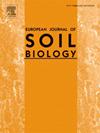Longitudinal distributions of CO2-fixing bacteria in forest soils and their potential associations with soil multifunctionality
IF 3.3
2区 农林科学
Q1 ECOLOGY
引用次数: 0
Abstract
Autotrophic microorganisms can fix carbon dioxide (CO2) into organic carbon (C), potentially offering a natural mechanism to mitigate global climate change. Forest soils, recognized as vast and critical C repositories with significant microbial CO2 fixation rates, remain understudied, particularly regarding the spatial variations of autotrophic bacteria and their relationship to soil functions in arid regions. In this study, we systematically investigated soil multifunctionality, along with the spatial distribution of autotrophic bacterial communities identified by the RubisCO cbbL and cbbM genes, and the driving factors across a longitudinal gradient in the Loess Plateau forest soils. The investigation spanned an ∼850 km west-east transect with precipitation below 600 mm. The alpha diversity of cbbL-containing bacteria, as measured by the Chao1 index, was correlated with climatic variables such as precipitation and elevation instead of local soil characteristics. In contrast, the alpha diversity of cbbM-containing bacteria was associated with soil properties. The community composition of autotrophic bacteria, based on cbbL and cbbM genes, showed greater similarity in soils from the eastern Loess Plateau and was distinct from those in the western region. The cbbL- and cbbM-containing generalist taxa were subject to differential selection and promotion between the eastern and western regions. Temperature, soil pH and spatial variables were key drivers influencing the community composition of cbbL- and cbbM-containing bacteria. The diversity and communities of soil autotrophic bacteria significantly affected soil multifunctionality. The study demonstrates that soil autotrophic bacteria in forest soils are intricately connected to climatic conditions, soil pH and spatial factors, significantly impacting soil multifunctionality. These insights provide evidence that can be instrumental in predicting and potentially enhancing the functional capacity of forest ecosystems in the Loess Plateau.
森林土壤中固氮细菌的纵向分布及其与土壤多功能性的潜在联系
自养微生物可以将二氧化碳(CO2)固定为有机碳(C),可能为减缓全球气候变化提供一种自然机制。森林土壤被认为是巨大而重要的碳储存库,具有显著的微生物二氧化碳固定率,但对其研究仍然不足,特别是关于自养细菌的空间变化及其与干旱地区土壤功能的关系。在本研究中,我们系统地研究了黄土高原森林土壤的多功能性、RubisCO cbbL 和 cbbM 基因鉴定的自养细菌群落的空间分布及其纵向梯度上的驱动因素。调查横跨降水量低于 600 毫米的西-东横断面达 850 公里。用 Chao1 指数测量的含 cbbL 细菌的α多样性与降水量和海拔等气候变量相关,而与当地土壤特性无关。相比之下,含 cbbM 细菌的α多样性与土壤特性相关。基于 cbbL 和 cbbM 基因的自养细菌群落组成在黄土高原东部的土壤中表现出更大的相似性,而与西部地区的土壤不同。含 cbbL 和 cbbM 的普通类群在东部和西部地区受到不同的选择和促进。温度、土壤pH值和空间变量是影响含cbbL和cbbM细菌群落组成的主要因素。土壤自养细菌的多样性和群落对土壤多功能性有显著影响。该研究表明,森林土壤中的土壤自养细菌与气候条件、土壤酸碱度和空间因素密切相关,对土壤多功能性有重要影响。这些见解为预测和潜在地提高黄土高原森林生态系统的功能能力提供了证据。
本文章由计算机程序翻译,如有差异,请以英文原文为准。
求助全文
约1分钟内获得全文
求助全文
来源期刊

European Journal of Soil Biology
环境科学-生态学
CiteScore
6.90
自引率
0.00%
发文量
51
审稿时长
27 days
期刊介绍:
The European Journal of Soil Biology covers all aspects of soil biology which deal with microbial and faunal ecology and activity in soils, as well as natural ecosystems or biomes connected to ecological interests: biodiversity, biological conservation, adaptation, impact of global changes on soil biodiversity and ecosystem functioning and effects and fate of pollutants as influenced by soil organisms. Different levels in ecosystem structure are taken into account: individuals, populations, communities and ecosystems themselves. At each level, different disciplinary approaches are welcomed: molecular biology, genetics, ecophysiology, ecology, biogeography and landscape ecology.
 求助内容:
求助内容: 应助结果提醒方式:
应助结果提醒方式:


